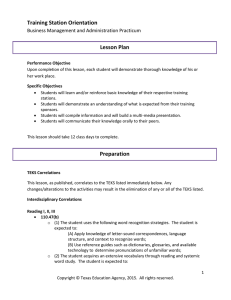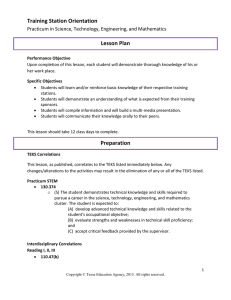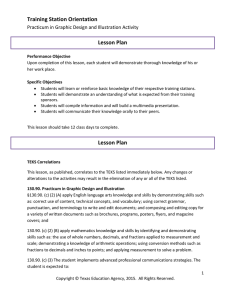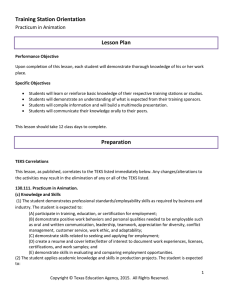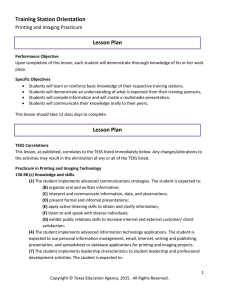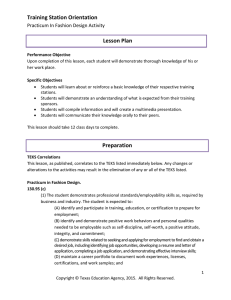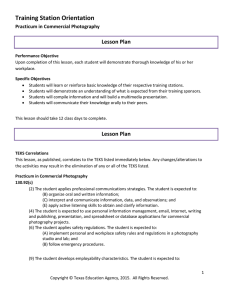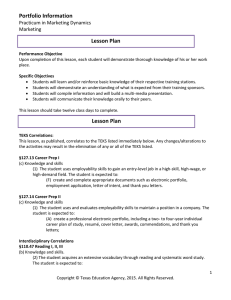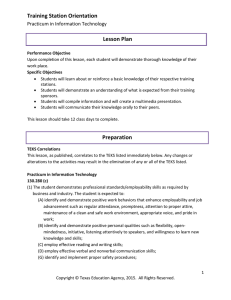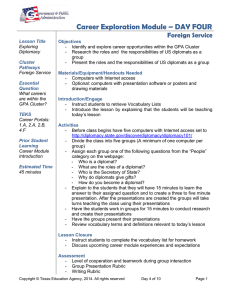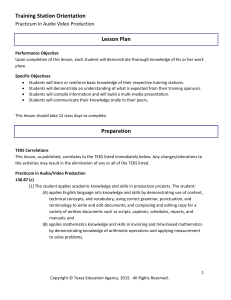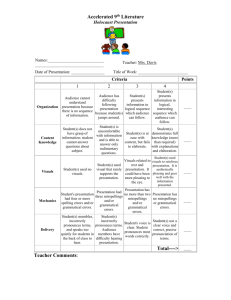Training Station Orientation Lesson Plan Computer Technician Practicum
advertisement
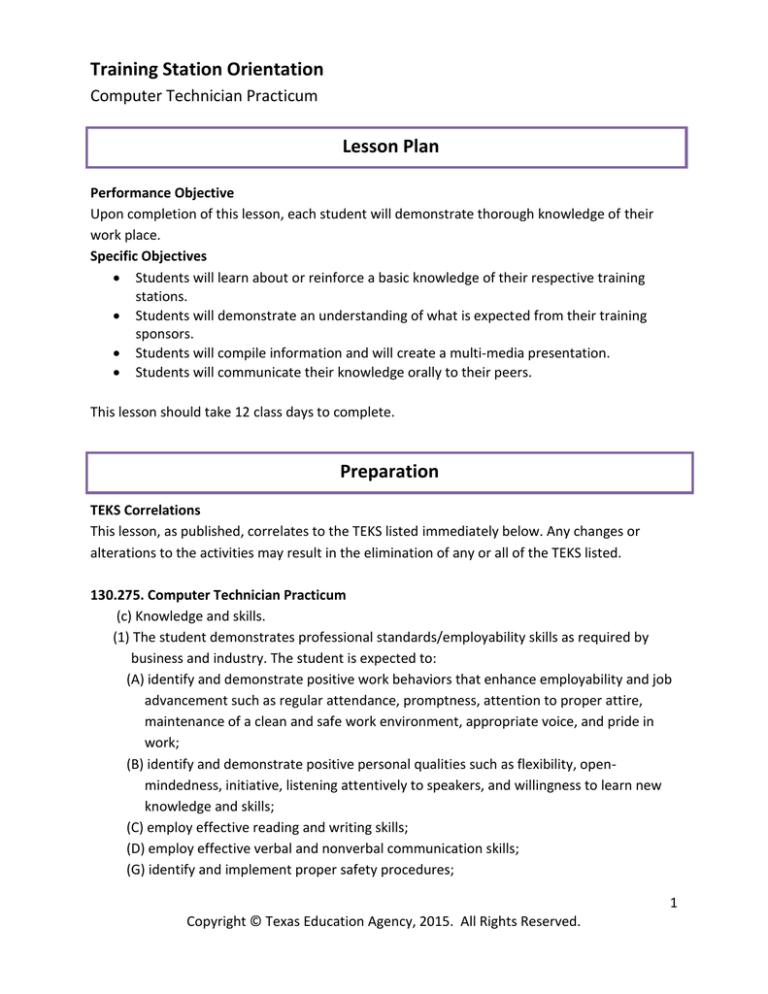
Training Station Orientation Computer Technician Practicum Lesson Plan Performance Objective Upon completion of this lesson, each student will demonstrate thorough knowledge of their work place. Specific Objectives Students will learn about or reinforce a basic knowledge of their respective training stations. Students will demonstrate an understanding of what is expected from their training sponsors. Students will compile information and will create a multi-media presentation. Students will communicate their knowledge orally to their peers. This lesson should take 12 class days to complete. Preparation TEKS Correlations This lesson, as published, correlates to the TEKS listed immediately below. Any changes or alterations to the activities may result in the elimination of any or all of the TEKS listed. 130.275. Computer Technician Practicum (c) Knowledge and skills. (1) The student demonstrates professional standards/employability skills as required by business and industry. The student is expected to: (A) identify and demonstrate positive work behaviors that enhance employability and job advancement such as regular attendance, promptness, attention to proper attire, maintenance of a clean and safe work environment, appropriate voice, and pride in work; (B) identify and demonstrate positive personal qualities such as flexibility, openmindedness, initiative, listening attentively to speakers, and willingness to learn new knowledge and skills; (C) employ effective reading and writing skills; (D) employ effective verbal and nonverbal communication skills; (G) identify and implement proper safety procedures; 1 Copyright © Texas Education Agency, 2015. All Rights Reserved. (H) demonstrate an understanding of legal and ethical responsibilities in relation to the field of information technology; and (I) demonstrate planning and time-management skills such as project management and storyboarding. (2) The student identifies various employment opportunities in the information technology field. The student is expected to: (A) improve on a personal career plan along with education, job skills, and experience necessary to achieve career goals; (B) develop a resumé and portfolio appropriate to chosen career plan, including letters of recommendation; and (C) illustrate interview skills for successful job placement. (3) The student applies academic knowledge and skills to research and develop projects. The student is expected to: (A) demonstrate effective verbal and written communication skills with individuals from varied cultures such as fellow workers, management, and customers; (B) complete work orders and related paperwork for repair and installation; (C) estimate supplies, materials, and labor costs for installation, maintenance, and repair work orders; and (D) read and interpret technical documentation such as schematics, drawings, charts, diagrams, technical manuals, and bulletins. (5) The student knows the concepts and skills that form the basis of computer technologies. (6) The student knows the proper function and application of the tools, equipment, technologies, and materials used in computer technologies. The student is expected to: (A) demonstrate safe use of equipment in computer technologies such as hand and power tools; (B) employ available reference tools, materials, and Internet sources to access information as needed; (C) demonstrate the proper handling and disposal of environmentally hazardous materials used in computer technologies; and (D) identify new and emerging technologies that may affect the field of computer technology such as quantum computing, photonics, and nanotechnology. (7) The student applies the essential knowledge and skills for computer technologies to career preparation, job shadowing, mentoring, or apprenticeship training in simulated and actual work situations. (10) The student provides support to computer users to maintain service. The student is expected to: (A) employ effective listening skills when working with clients to identify support needs; (B) identify customer need and formulate a support plan; (C) create queries and reports and assess critical system information; 2 Copyright © Texas Education Agency, 2015. All Rights Reserved. (D) employ problem-solving skills in performing support, maintenance, and repair; (E) use hardware and software diagnostics; (F) report to the user the cause of and solution to the problem; and (G) create written documentation indicating cause of and solution to the problem. Interdisciplinary Correlations English 110.42(b) Knowledge and skills. (6) Reading/word identification/vocabulary development. The student uses a variety of strategies to read unfamiliar words and to build vocabulary. The student is expected to: (A) expand vocabulary through wide reading, listening, and discussing; and (B) rely on context to determine meanings of words and phrases such as figurative language, idioms, multiple meaning words, and technical vocabulary. (7) Reading/comprehension. The student comprehends selections using a variety of strategies. The student is expected to: (F) identify main ideas and their supporting details; (G) summarize texts; and (J) read silently with comprehension for a sustained period of time. Speech 110.56 (b) Knowledge and skills. (1)(A) explain the importance of communication in daily interaction; (2)(E) participate appropriately in conversations for a variety of purposes; (3)(A) The student uses appropriate communication in group settings; (E) use appropriate verbal, non-verbal, and listening strategies to communicate effectively in groups; (5)(B) use language clearly and appropriately; (E) interact with audiences appropriately; Tasks Students will interview employer or owner to obtain necessary information. Students will obtain company information from employee handbooks, trade journals, or employee handbooks. Accommodations for Learning Differences Lessons should accommodate the needs of every learner. These lessons may be modified to accommodate your students with learning differences by referring to the files found on the Special Populations page of this website (cte.unt.edu). 3 Copyright © Texas Education Agency, 2015. All Rights Reserved. Preparation Secure the computer lab if you do not have immediate access to one in your classroom. Copy the handout sheets and rubric for the students. Instructional Aids Student handouts Grading rubric Internet access Materials Needed Paper for essay Camera or phone with camera Flash drive Equipment Needed Computers (for students to complete project) Projector (for digital presentation) Scanner to scan pictures or materials brought to class 4 Copyright © Texas Education Agency, 2015. All Rights Reserved. Outline MI OUTLINE NOTES TO TEACHER Copy the instructions and grading rubric and make into a packet. Assignment Outline: I. Directions: a. The packet of information must be completed by interview, website, or handbook. b. Minimum of 12 digital photos c. Floor plan may be scanned II. Grading: a. Completion of packet b. Multi-media presentation c. Pictures d. Professionalism during presentation III. Presentation must have: a. Name and logo b. Floor plan c. Policies/procedures d. Company history e. Supervisor’s or owner’s previous experience f. Site of company g. Organizational chart h. Inclusion: i. 3,2,1 IV. Layout format must be followed ***Handout the Portfolio Guidelines (p. 172) Tell the class about some of the things you learned at previous jobs. Explain how those skills helped you to become a teacher. Explain the necessity of learning as much as possible about a job because some of the skills learned will help with future employment. Explain to the class that customers see a business much differently than the employees see it. Ask the class if they ever wanted to work at a place where they shopped. Have them give reasons why they wanted to work there. Go over all the criteria in the assignment and check for understanding. Explain the guidelines. Students can set it up while working on the Training Station Orientation project. Multiple Intelligences Guide Existentialist Interpersonal Intrapersonal Kinesthetic/Bodily Logical/Mathematical Musical/Rhythmic Naturalist Verbal/Linguistic Visual/Spatial 5 Copyright © Texas Education Agency, 2015. All Rights Reserved. Application Guided Practice Using the digital presentation, the teacher will go over the requirements of this project. The student will follow along and make notes on their hard copy. Students will be strongly encouraged to take the assignment packet to their job sites so employers will know about the activity. Ask students to “map” out their plan, using a Mapping Tool from the Appendix of this document. Give some ideas to students during the brainstorming session before the end of the first class period. Independent Practice Employer Project Students will work at their own pace to complete the Employer Project activity. All work is done in class (other than interviews) so the teacher can check for understanding. Students are strongly encouraged to take ownership of this activity and to establish a workable pace in order to complete the project on time. Students should be prepared to present their projects to the class. Summary Review Why do customers see a different perspective of a business operation that that of the employees? Why is it important to learn as much as possible about the business establishment? Why are procedures established and expected to be followed? Evaluation Informal Assessment Instructor will observe students during Independent Practice. Instructor will assist students as needed. Formal Assessment Use the Individual Presentation Rubric to evaluate. 6 Copyright © Texas Education Agency, 2015. All Rights Reserved. Employer Project Directions: You are to complete this packet of information by conducting interviews with employers and or co-workers. It you have an employee training manual; you may use it as a source. You might even have to get some information from your company’s website. In addition to the packet, you will include a minimum of 12 digital photos in your presentation. You may bring the pictures to class on a flash drive, a memory card or CD to import into your project. All information will be compiled to prepare a multi-media presentation which will be shown to the class when you present your project. You will be graded on: Completion of the packet Multimedia presentation Use of pictures (as specified) Professionalism during presentation, including professional dress **Bonus credit will be given if your employer attends your presentation! Presentation must have: Name and logo of company Floor plan Policies and procedures History of the company Supervisor (or owner) previous experience Site of company (including number of employees) Organizational chart Miscellaneous supplemental information Photos (either interspersed within presentation or at the end of the presentation) If you were in charge, explain: 3 things you like about the training station 2 things you would change 1 thing you have learned that will help you in your career choice This project is due on: ___________________________ 7 Copyright © Texas Education Agency, 2015. All Rights Reserved. Layout Format: 1. 2. 3. 4. Student’s name Company’s name, address Type of company In a minimum of 75 words, (typed and turned in separately) state what your first day on the job was like. 5. Procedures for reporting to work 6. Procedures for calling in sick or calling in late 7. Procedures for asking for time off 8. What types of benefits are available 9. Length of time the manager or owner has been with company 10. What prior training did the manager or owner have? 11. What type of education is needed for a managerial position with the company? 12. Procedure for handling cash or legal documents(beginning and ending shifts), OR 13. Procedure for accessing or handling clients files 14. Names of competitors and their locations 15. Organizational chart 16. Floor plan 17. Names of vendors and suppliers 18. Procedures for handling returns, issuing credit, keeping clientele happy 19. What types of jobs or careers will your current training station prepare you for? 20. What is the procedure for handling theft (by employees or clientele)? 21. What is the strangest thing that has happened to you on the job? 8 Copyright © Texas Education Agency, 2015. All Rights Reserved. Individual Presentation Rubric Presentation Title: Name Teacher ID# Date of Presentation Criteria Organization Content Knowledge 0–5 6 – 10 11 – 15 16 - 20 Audience cannot understand presentation because there is no sequence of information. Audience has difficulty following presentation because student jumps around. Student is uncomfortable with information and is able only to answer rudimentary questions. Student occasionally used visuals that rarely support text and presentation. Student presents information in logical sequence which audience can follow. Student presents information in logical, interesting sequence which audience can follow. Student demonstrates full knowledge (more than required) with explanations and elaboration. Student used visuals to reinforce screen text and presentation. Student does not have grasp of information; student cannot answer questions about subject. Student used no Visuals visuals. Mechanics Delivery Points Student is at ease with content, but fails to elaborate. Visuals related to text and presentation. Student’s presentation had four or more spelling errors and or grammatical errors. Presentation had three misspellings and or grammatical errors. Presentation had no more than two misspellings and or grammatical errors. Presentation had no misspellings or grammatical errors. Student mumbles, incorrectly pronounces terms and speaks too quietly for students in the back of the class to hear. Student incorrectly pronounces terms. Audience members have difficultly hearing presentation. Student’s voice is clear. Student pronounces most words correctly. Student used clear voice and correct, precise pronunciation of terms. Total Teacher Comments: 9 Copyright © Texas Education Agency, 2015. All Rights Reserved.
